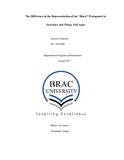| dc.contributor.advisor | Chowdhury, Rukhsana Rahim | |
| dc.contributor.author | Tabassum, Sazerin | |
| dc.date.accessioned | 2018-01-14T10:50:46Z | |
| dc.date.available | 2018-01-14T10:50:46Z | |
| dc.date.copyright | 2017 | |
| dc.date.issued | 2017-08 | |
| dc.identifier.other | ID 14203006 | |
| dc.identifier.uri | http://hdl.handle.net/10361/9049 | |
| dc.description | This thesis is submitted in partial fulfillment of the requirements for the degree of Bachelor of Arts in English, 2017. | en_US |
| dc.description | Cataloged from PDF version of thesis. | |
| dc.description | Includes bibliographical references (pages 36-37). | |
| dc.description.abstract | Colonialism is a historical phenomenon which was established a long time ago where a
nation proceeds to extend and retain its authority over other people and territories. It was a policy
followed by a number of European countries in a quest for conquering parts of the world. The
drastic aftereffects of colonialism are seen even today evidently through the struggles of several
post-colonial countries. At a certain point, it appeared to be established that the number of
colonies of a country was the symbol of the strength of the country. This inspired voyagers to go
out and find new lands to conquer, in order to establish their power and dominance.
The European colonial period is the time period from the 16th century to the mid-20th century
when several European powers established colonies in Asia, Africa, and America. Colonialism
affected the countries in a number of aspects, including the social, political and economic parts
of the people’s lives. Colonialism had a massive impact on literature as well. There are a number
of works of literature which have been affected due to the outcome of colonialism.
Literature has always been and always will be a door to events that take place in the
world. Thus it is very apparent that the events of colonisation will have a huge effect in the field
of literature. This is exactly what we see in the selected two novels by the well-respected authors.
This paper focuses on the protagonists of Aphra Behn’s acclaimed novel Oroonoko and Chinua
Achebe’s Things Fall Apart. Both the novels focus on a member of a black community and show
how that person is affected by the process of colonialism. Behn’s novel revolves around the
central protagonist, Oroonoko who was born a prince but because of a series of unfortunate
events, ends up as a slave. The story is an account of what happens to this great black prince.
Tabassum 2
Achebe’s novel tells the story of a warrior and a respected member of his community Okonkwo,
who finally comes to realize the extent of the power of the British government. He gradually sees
that all the great warriors of his village are preparing to give up without a fight and that all his
traditions and customs are slowly coming to an end. It is this realization that in the end causes
him to take his own life, even though the act of committing suicide is seen in a very negative
light in their culture. Thus, we see this once great and brave man decide to take a cowardly way
out in life. This paper will show the difference between the British author Aphra Behn and the
Nigerian novelist Chinua Achebe’s representation of a black protagonist in their respective
novels. In order to show this distinction between the two novels, we will take a thorough look at
how the two novels vary in the narration, the description of the homeland and finally how the
two authors explore the ultimate fate of respective protagonists.
The paper is divided into six chapters which will explain in details how the two authors
portray the same concept in very different manners. The paper will revolve round the lifestyle
and several events surrounding the protagonists, which the authors have portrayed in very
different lights in the two novels. By taking an elaborate look at the two novels, what this paper
intends to establish is how the two authors focus on a similar concept and yet show a very
different perspective surrounding the concept. | en_US |
| dc.description.statementofresponsibility | Sazerin Tabassum | |
| dc.format.extent | 37 pages | |
| dc.language.iso | en | en_US |
| dc.publisher | BARC University | en_US |
| dc.rights | BRAC University thesis are protected by copyright. They may be viewed from this source for any purpose, but reproduction or distribution in any format is prohibited without written permission. | |
| dc.subject | Black protagonist | en_US |
| dc.subject | Oroonoko | en_US |
| dc.subject | Things fall apart | en_US |
| dc.subject | Colonialism | en_US |
| dc.title | The difference in the representation of the “Black” protagonist in Oroonoko and Things Fall Apart | en_US |
| dc.type | Thesis | en_US |
| dc.contributor.department | Department of English and Humanities, BRAC University | |
| dc.description.degree | B.A. in English | |

